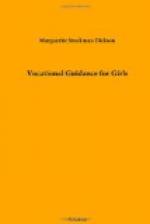[Illustration: The little girl adapts and imitates home activities in play]
It is perhaps scarcely necessary to call to mind the educational advantages possible in the planning and making of bedding, draperies, table linen, towels, couches and pillows, window seats, and other furnishings, as well as in the ingenuity brought into play in evolving kitchen utensils and in stocking the cupboards with the necessities for housekeeping. The free interchange of ideas should be encouraged, and the spirit of seeking the best fostered.
The conspicuous results in this work are two: we secure the child’s attention to details of housekeeping, and we build up a foundation ideal of what housekeeping equipment should be. Children in poorly equipped homes may find the most practical of training in this way. My experience has been that teachers have only to begin this work in order to arouse enthusiasm in any class of little girls. Once begun, it carries itself along. There should be no compulsion in this work. Choice and not necessity must be the rule in all our training for homemaking. To compel a child’s attention to that which she will later do voluntarily, if at all, will at the very outset defeat our purpose.
[Illustration: Making furniture for a doll’s house affords educational advantages in emphasizing the details of housekeeping]
The finest sort of cooeperation arises in this work when parents are led to provide the little girl at home with a doll’s house fashioned like the one at school. Perhaps they may go a step farther and find space for a larger scheme of housekeeping, in the attic or elsewhere. Cooeperation among the children means interchange of ideas, materials, and labor, most helpful to social ideals.
From the furnishing of the doll’s house it is easy to pass to plays involving the activities of home life. Children delight in sweeping, dusting, washing dishes, arranging cupboards and pantries, and making beds in their miniature houses, and if their efforts are wisely directed, orderly habits easily begin to form. In all these varieties of work the children must be led to feel that there is a right way, and that only that way is good enough, even for play.
The great result of all play housekeeping is the formation of ideals. It is just as easy to learn at seven or eight the most efficient way of washing dishes as it is to defer that knowledge until years of inefficient work harden into inefficient habits. The teacher will find abundant and interesting studies in household efficiency in recently published books to inspire her guidance of the children’s activity.




